Bhaddākāpilānī Therī
Her Past Aspiration
During the time of Padumuttra Buddha, Bhaddākāpilānī was born as the wife of Vedeha, a millionaire of Haṃsavatī. When she was listening to a discourse by the Buddha, she saw a bhikkhunī being named as the ‘foremost bhikkhunī in supernormal power of remembering past existences’. She aspired to be such a bhikkhunī and, after making an extra-ordinary offering, mentioned that aspiration before the Buddha while her husband (Mahā-Kassapa in this life) wished to be chief among those who practice austere vows (dhuṭavādinaṃ). Together they did many good deeds and were reborn in heaven.
Her Existence as the Wife of A Householder
In the time of Vipassī Buddha, the husband was the brahmin Ekasāṭaka and she was his wife. In his next birth he was king of Bārāṇasī and she his chief queen. Together they made offerings to eight Pacceka Buddhas on a very lavish scale.
After passing away from her existence as the chief queen of the king of Bārāṇasī, she was reborn in the devaworld and subsequently either in the human world or the deva-world, for a hundred thousand world-cycles. Finally, she was reborn as the wife of a householder in Bārāṇasī. (he was her same previous husband)
One day, at the householder’s residence, there was a quarrel between the householder’s sister and his wife. While they were quarrelling, a certain Paccekabuddha appeared, to receive alms-food. Then the householder’s sister offered the food to the Paccekabuddha and said:
“May I be able to avoid her even from a distance of hundred yojanas,” and she meant by ‘her’, the householder’s wife. While standing at the doorway, the wife heard the wish, and thinking:
“May the Paccekabuddha not partake of the other woman’s food,” she took the alms-bowl and threw away the food and filled the bowl with mud before she gave it back to the Paccekabuddha. Seeing what the wife was doing, the sister scolded her, saying:
“Hey you stupid woman, you may abuse me, or even beat me if you wish but it is not proper to throw away the food and fill the bowl with mud and give it back to the Paccekabuddha, who have fulfilled pāramīs for so long a period of innumerable years.”
Then only did the householder’s wife regain her moral sense and said: “Wait, please, Venerable Sir.”
Then she begged his pardon and threw away the mud from the bowl and washed it thoroughly and rubbed it with fragrant powder. She then filled the bowl with catumadhu, and poured butter which was white like the colour of thickly grown lotus, and added brilliance thereby. Handing the bowl back to the Paccekabuddha, the wife said:
“Just as this food shines, even so may my body emanate brilliant rays.”
The Paccekabuddha spoke words of appreciation, gave His blessing and flew up into the sky. The husband and wife performed meritorious deeds throughout their lives and upon their death they were reborn in the divine world.
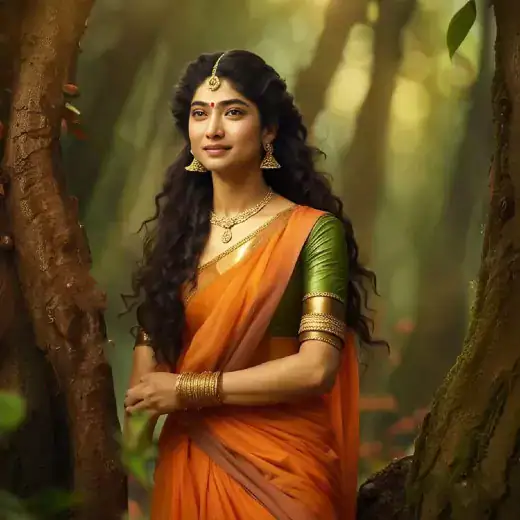
-
Save
As the wife of the Bārāṇasī Merchant
Again, when they passed away from the divine world, the householder was reborn during the lifetime of the Buddha Kassapa, in the city of Bārāṇasī, as the son of a wealthy merchant who owned eighty crores worth of riches. Similarly, his wife became the daughter of another wealthy merchant.
When the son came of age, that very daughter was brought to his home as his wife. Because of her past misdeed, the result of which until then had been latent, but, as soon as she passed the threshold while entering the house, the putrid smell issued forth from her body was as though the toilet was opened. When the merchant son asked whose smell it was and came to know that it was the odour of the bride who had just come, he ordered that the bride be expelled and sent back to her parents’ house in the same pomp and grandeur that had attended her when she came. In this way, she had to return to her parents’ home from seven different places because of the foul smell that appeared as soon as she entered the threshold of her husband-to-be’s house. Terrible indeed is an evil deed!
At that time, as Buddha Kassapa had attained Parinibbāna, people began to erect a relic-shrine (dhātu-cetiya), a yojana high with bricks of gold worth a hundred thousand and was made from pure gold bullion. While the cetiya was under construction, it occurred to the lady thus:
“I am the one who had to return from seven places. What is the use of my living long?”
So she sold her jewellery and with the money thus obtained she had a gold brick made, one cubit long, half a cubit wide and four fingers thick. She then took the gold brick together with orpiment and eight lotus stalks and went where the shrine was situated.
At that moment, a brick was wanted to fill the gap that appeared when an encircling layer of bricks were laid as part of the shine. So she said to the master mason: “Please, Sir, fill the gap with my brick.”
“O lady,” replied the master mason, “you have come at an opportune moment. Do it by yourself.”
When permitted wholeheartedly thus, the wealthy daughter climbed up to that spot and, having mixed the orpiment with the liquid ingredient, she filled the gap with her brick by means of that cohesive mixture. Then she paid homage by placing the lotus stalks at the brick and expressed her wish:
“In whatever existence in saṃsāra, may the sandalwood fragrant emanate from my body and lotus fragrance from my mouth!” After worshipping the shrine respectfully she went home.
At that moment, the wealthy merchant’s son, to whom the lady was to be married first, remembered her. A festival was held in full swing then. The son asked his men:
“Once there was a girl brought to my house; in whose house is she now?”
When the men answered that the young lady was still at her father’s house, the man said: “Friends, go and fetch her. Let us enjoy the festival together with her.” So saying he sent his men for her.
When they got to the young lady’s residence, they paid respect to her and stood there. When the lady asked about their visit, they spoke of their purpose.
“Brothers,” said the lady, “I have offered all my ornaments in honour of the cetiya. I have no more to put on.”
The men reported the matter to their master. “You just bring the girl,” said the man, “she will get jewellery.”
So the lady was brought to him by his men. As soon as the merchant’s daughter entered the house, the whole house was filled with sandalwood fragrance as well as that of lotus.
The wealthy son asked: “The first time you came here your body issued forth foul smell. But now it is sandalwood fragrance from your body and lotus’ from your mouth. What is the reason for that?”
When the whole story of her meritorious act was told, the man’s faith developed as he thought: “Ah, the Buddha’s Teaching is indeed able to free one from the cycle of suffering!”
Accordingly, he wrapped the golden shrine, measuring a yojana, with velvet blankets. At certain places, he made decorations in the form of golden paduma lotus flowers so as to add exquisite beauty to the shrine, the flowers being the size of a chariot’s wheel. The hanging stems and stalks of the golden lotus were twelve cubits in length.
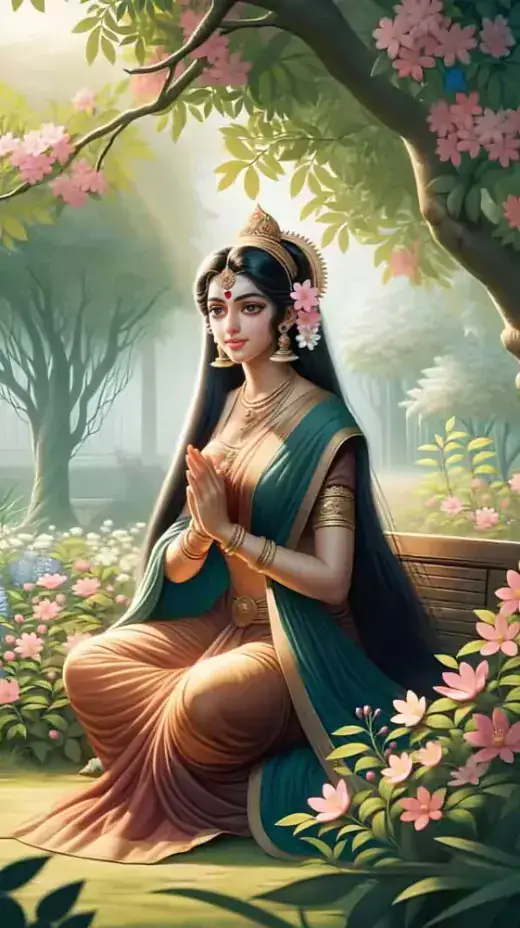
-
Save
Becomes the Chief Queen of King Nanda
Having done meritorious deeds in that existence, the wealthy husband and wife lived the full span of life and were reborn in a divine realm on their death. Again, when they passed away from that realm, the husband was reborn at a place a yojana away from the city of Bārāṇasī, in the family of a noble man, while the wife became the eldest princess in the palace in that city.
When both came of age, an announcement was made to hold a festival in the village where the noble man’s son (Nanda) lived. Then Nanda asked his mother for a dress to put on while enjoying the festive amusements and got a washed, second hand dress. The son asked for another dress on the ground that the one given to him was coarse. The mother gave another dress as a substitute. But it was also rejected because of its roughness. When the rejection was repeated several times in this way, the mother said:
“We are of such a noble man’s household, dear son. We are not fortunate enough to have clothes better than this.”
“In that case, mother, I shall go where finer clothing is available.”
“I wish you, dear son,” replied the mother, “kingship of Bārāṇasī even today.” Thus the mother gave her consent with such auspicious words.
Having done obeisance to his mother, the young Nanda asked her permission to go. And the mother willingly gave her permission. But she did so because of her conviction, thinking:
“Where is my son going? He has nowhere else to go. He will be staying here and there in my home.”
But Nanda left his village for Bārāṇasī and took a nap with his head covered on the stately stone-couch in the royal garden. That was the seventh day after the King’s demise.
The ministers performed the funeral rites and held a meeting in the courtyard, discussing among themselves: “Only a daughter was born to the King. He had no son. A kingdom without a king is unseemly. Who should become the monarch?”
They proposed one another for kingship saying: “Be our king!”, “(No) You should become the ruler.” Then the Brahmin purohita said: “We should not see many persons [to choose from]. Let us send the state chariot to search for the deserving one!” When the purohita’s decision was agreed by all, they let the state chariot loose that was followed by the four army divisions with the five kinds of musical instruments played.
The chariot departed through the eastern gate of the city and ran towards the royal garden. Some people suggested that the chariot should be turned back because it was running towards the garden as a result of its force of habit. The suggestion, however, was rejected by the purohita. The chariot entered the garden, circumambulated Nanda three times and stopped and set itself ready for Nanda to get on. After removing the edge of the covering cloth, from Nanda, the purohita studied his soles and declared:
“Let alone the Jambudīpa, this man is worthy to rule over the four continents with their two thousand surrounding smaller islands.”
He also ordered the musicians to play three times.
Then Nanda removed the cloth that covered his face and saw the ministers, with whom he entered a conversation:
Nanda: For what purpose did you come here?
Ministers: Great King, the kingship of Bārāṇasī has come to you.
Nanda: Where is the King?
Ministers: He has passed away, Sir.
Nanda: How many days have elapsed since his passing away?
Ministers: Today is the seventh day.
Nanda: Did not the late King have a son or a daughter?
Ministers: He had only one daughter, but no son, Great King.
When the ministers said thus, he accepted the kingship, saying: “In that case, I shall act as King.”
Then the ministers constructed a pavilion for consecration and brought the princess who was fully bedecked and made him King of Bārāṇasī after duly holding royal consecration ceremony.
Thereafter, the ministers offered a dress costing a thousand coins to the consecrated Nanda. “Friends, what sort of clothing is it?” asked King Nanda.
“Great King, it is for you to put on.”
“Friends,” enquired the King, “this is but a coarse clothing. Have you not got a finer one?”
“Great King, there is no finer one among the clothes to be used by men,” replied the ministers.
“Did your late King put on such a dress?” asked Nanda. When the ministers answered in the positive, King Nanda remarked:
“Your late King did not seem to be one of great fortune. Bring a golden jar [full of water]. We shall get very fine clothing.” The ministers brought it and handed it to the King.
Rising from his seat, the King washed his hand and mouth, and carrying the water with his cupped hand, he tossed it in the direction of the east. Then eight wish-fulfilling trees emerged, breaking up the great massive earth. When he did the same in the southern, the western and, northern directions, eight trees in each direction emerged. In this way there were thirty-two wish-fulfilling trees in the four directions. King Nanda wrapped the lower part of his body in a divine robe and put on another one for the upper part. Then he had an announcement made by the beat of drum. The announcement being:
“In this state of King Nanda let no women spin yarns!”
He also raised the royal white umbrella, bedecked himself with adornments, entered the city on the back of an elephant, ascended the upper terrace of the palace and enjoyed a great kingly life.
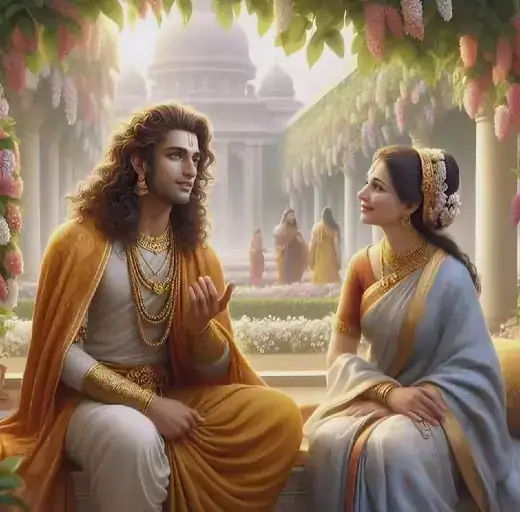
-
Save
After some years of Nanda’s enjoyment of kingly life, the Queen, watching his life, showed her manner, expressing pity as she thought: “Rare indeed is a new act of merit!”
When the King asked why her manner expressed pity, she reminded: “Your luxurious life is really great. That is because you have truly performed good deeds with faith in the past. But now you do nothing for future happiness.”
“Whom should we give alms?” argued the King, “There are no virtuous recipients!”
“Great King, Jambudipa is not void of Arahats. You better arrange things to be given. I shall bring worthy individuals to receive,” said the Queen boldly.
The next day the King had the offerings arranged at the eastern gate of the city. The queen performed a vow early to observe the precepts and facing to the east and prostrating, invited by word of mouth: “If there be Arahats in the eastern direction, may they come and accept our alms-food!”
Since there were no Arahats in that direction, nobody came to do so. The offerings had to be made to destitutes and beggars. On the next day, similar arrangements took place at the southern gate. The third day saw them too at the western gate. But no Arahats came from those directions either as there were none.
On the fourth day, the offerings were arranged at the northern gate, and when the Queen extended her invitation as before, Paccekabuddha Mahāpaduma, the oldest of five hundred Paccekabuddhas, who were all sons of Queen Padumavatī, addressed his younger brothers: “Brother Paccekabuddha, King Nanda has invited you. Accept his invitation with pleasure!” The Noble Ones accepted the invitation with pleasure. They washed their faces at the Anotatta lake and then disappeared from there and reappeared at the city’s northern gate.
The citizens went to the King and informed him: “Great King, five hundred Paccekabuddhas have come.”
With the Queen, the King went to the Paccekabuddha and welcomed them with folded hands. Holding the alms-bowl, he brought the five hundred Paccekabuddhas to the upper terrace of the palace after performing the great act of almsgiving. When the performance was over, the King, sitting at the feet of the eldest member of the assembly and the Queen, at the feet of the youngest member, made a request, saying:
“Venerable Sirs, if you stay in our garden, you all will be happy with our supply of requisites. There will also be growth of merit on our part. Therefore, please give us your promise to stay in the garden of Bārāṇasī City.”
The promise was given to the King, who made full accommodations, such as five hundred lodgings, five hundred walks, etc., in the royal garden. The four requisites were also provided to them so that they might find no trouble.
When such provision had lasted for some time, a state of unrest and disturbance took place in the border areas. The King asked his Queen to look after the Paccekabuddhas during his absence to quell the border rebellion.
As the King had instructed, the Queen supported the Paccekabuddhas with the four requisites carefully. After some days, just before the King’s return, the life process of the Paccekabuddhas came to an end. So the eldest one, Mahāpaduma, spent all three watches of the night in jhāna, and standing and leaning against the wooden back-rest, attained anupādisesa-parinibbāna. In the same manner the rest of Paccekabuddhas attained Parinibbāna.
On the next day, the Queen prepared the seats for the Paccekabuddhas by applying cowdung, strewing flowers and letting the air pervaded with perfumes, and waiting for their arrival. As she did not see any signs of their approaching, she sent a male servant, saying:
“Go, my son, and find out the reason. Is there any mental or physical discomfort happening to the Venerable Ones?”
When the royal servant went to the garden and looked for Paccekabuddha Mahāpaduma, after opening the door of His dwelling, he did not see Him there. So he went to the walk and saw Him standing and leaning against the wooden board. After paying homage to Him, the servant invited the [first] Paccekabuddha saying: “It is time to have meal, Venerable Sirs!” There was no reply at all.
Thinking that the Paccekabuddha was sleeping, the servant moved nearer and felt the back of His feet. After making such investigations, he came to know full well of the Paccekabuddha’s attainment of Parinibbāna, for His feet were cold and stiff. So he went to the second Paccekabuddha and then subsequently, until the last one. When he investigated thus, he realized that the Paccekabuddhas had all reached the state of total extinction. On his return to the palace, the Queen asked him:
“Where are the Paccekabuddhas, son?”
“They had all attained Parinibbāna, Madam,” answered the servant.
The Queen wept bitterly and went out from the city to the royal garden with citizens and performed funeral rites and cremation. She took their relics and had a cetiya built (with the relics enshrined).
Having brought the border areas to normalcy, the King returned to the city and on seeing the Queen who had come to meet him, he asked: “Dear Queen, did you attend to the Paccekabuddhas without any negligence? Are the Noble Ones well?”
When the Queen replied that they had passed into Parinibbāna, the King was shocked and reflected: “Even to these Wise Ones of such nature occurred death! How can there be liberation from death for us!”
The King did not proceed to the city but immediately went to the royal garden. He called his eldest son and handed kingship over to him and himself adopted the life of a recluse (like a monk in the dispensation of a Buddha).
The Queen too, thinking: “If the King becomes a recluse, what is there for me to do? Of course, there is none!” she followed suit as a female ascetic in the royal garden. Having developed jhānas, both were reborn in the realm of Brahmās.
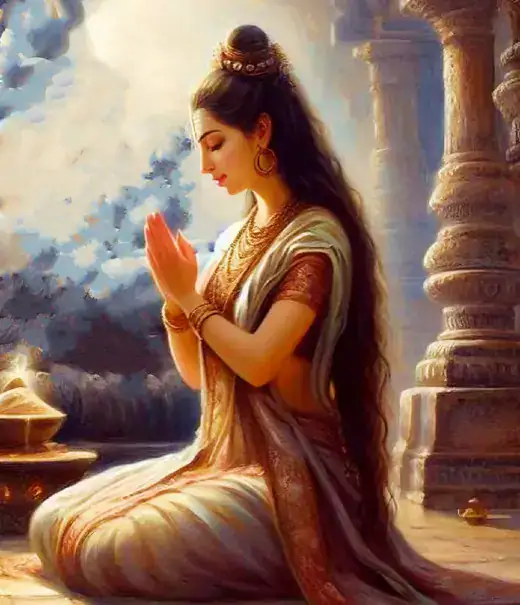
-
Save
Final Existence
While they were still in the Brahmā’s realm, the time had come for our Buddha to arise. At that time, Pippali the youth, the future Mahā Kassapa, took conception in the womb of the wife of a wealthy brahmin, named Kapila, in the brahmin village of Mahātittha, in the Magadha country whereas, his wife, the future Bhaddākāpilānī, took conception in the womb of the wife of another wealthy brahmin, a Kosiya descendant, in the city of Sāgala, also in the Magadha kingdom.
When they grew up, the young Pippali, being twenty years of age and Bhaddākāpilānī was sixteen, the former’s parents noticed that their son had come of age and insisted that he be married, saying: “Dear son, you have come of age to raise a family. One’s lineage should last long!”
As Pippali had come from the Brahmā-world, he refused to agree and said: “Please do not utter such words into my ears. I shall attend to you as long as you live, and when you are gone, I shall take up a homeless life as a recluse.”
After two or three days, the parents again persuaded him. The son remained resolute. Another persuasion took place but that too fell on deaf ears. From that time onwards, the mother was insistent.
When the insistence became too unbearable, Pippali thought: “I shall let my mother know that how much I want to become a monk!”
So he gave a thousand ticals of gold to the goldsmiths, asking them to create a gold statue of a girl out of it. When the statue had been created and polishing had been done, he dressed the statue with red garments and adorned it with colourful flowers and brilliant ornaments. Then he called his mother and said:
“O mother, I shall remain at home provided I get a girl as beautiful as this statue! If not, I shall not do so.”
Since the brahmin mother was wise, she considered: “My son is one who has done good works, who has performed alms-giving, who has expressed his noble aspiration. While he was engaging in acts of merit in his past existence, it was unlikely that he did them alone. Indeed my son must have an excellent woman, very pretty like the golden statue, with whom he did meritorious deeds.”
So considering, she summoned eight Brahmins, had a great honour made to them and had the gold statue placed on a chariot and said:
“Go, brothers! If you see a girl resembling this gold statue in a family who equals ours in caste, lineage and wealth, give the statue to her as a gift or as a pledge.”
With these words she sent the Brahmins away.
The eight Brahmins admitted, saying: “This indeed is a task to be done by the wise like us.”
So saying, they left the village and discussed among themselves on the destination of their journey. Then they decided unanimously thus: “In this world, the country of Madda was the home of beautiful women. Let us go to Madda land.”
So they were to the city of Sāgala which lay in that state. Having left the statue at the bathing ford in that city, they were watching from a proper place.
At that time, the female attendant of Bhaddākāpilānī, the daughter of a wealthy brahmin, bathed her and bedecked her with ornaments and left her in the chamber of splendour before she went to the bathing ford. On seeing the statue she thought:
“My mistress has come ahead of me!” Then she scolded her and grumbled in various ways. “Hey little stubborn daughter! Why are you staying here alone?” As she said: “Go home quick!” she raised her hand to strike her mistress. When she actually did strike the back of the statue, the whole of her palm was hurt very much as though she had struck a stone slab. The female attendant step back and spoke harshly to pick up a quarrel thus:
“Oh! Although I saw this woman of such awful touch and thick neck, how foolish I have been to mistake her for my mistress! She is not worthy ever to hold my lady’s skirt!”
Then the eight Brahmins surrounded the attendant, asking: “Is your mistress of such beauty?”
“What beauty is of this lady? Our lady’s beauty is more than a hundred times or a thousand times superior to that of this lady,” retorted the attendant, “if she sits in a room of twelve cubits, it is not necessary to light a lamp there; darkness can be expelled by her natural complexion.”
“In that case,” said the Brahmins, “come, let us go!” So saying they took the attendant, and having brought the gold statue, they went to the house of the wealthy Brahmin of Kosiya clan and stopped at the doorway to announce their visit.
The Brahmin treated them well as a host and asked them as to where they came from. They replied that they came from the home of the wealthy Brahmin Kapila of Mahātittha village, in the Kingdom of Magadha. When the host asked for the reason, they told him of the purpose of their visit.
“Friends,” said Brahmin Kosiya: “It is a welcome purpose. Kapila Brahmin is equal to me by birth, by descent and by wealth. I shall give our daughter as a bride.”
Having promised thus, Brahmin Kosiya took over the statue. The visiting Brahmins then sent a message to Brahmin Kapila, saying: “The bride has been found. Go ahead with whatever is necessary.”
Getting the news, the servants of Pippali transmitted it to him gleefully, saying: “Master, the bride for you, who looks like your gold statue, has been found, it is learnt!”
But Pippali reflected: “I thought it was impossible to get her. Now they said that ‘the bride has been found!’ As I do not want her, I shall write a letter and send it to her.”
So he went to a secluded place and wrote a letter as follows:
“I would like my dear sister to marry another proper man of equal by birth, descent and wealth. I am one who will adopt the life of a recluse in a forest. I do not wish you to be in distress later on.”
Then he sent the letter secretly to Bhaddākāpilānī.
When Lady Bhaddākāpilānī, learnt the news that her parents were desirous of giving her in marriage to Pippali the youth, son of the wealthy Brahmin Kapila of Mahātittha village, Magadha country, she similarly went into seclusion and wrote the following letter:
“I would like my brother to get married with another woman of equal caste, family and wealth. I am one going forth and becoming a female recluse. I do not want you to be unhappy afterwards.”
She then sent the letter in secret to Pippali.
When the two parties of messengers met in midway, Bhaddākāpilānī’s men asked: “From whom is the letter you are carrying, friends, and to whom is it going?” Pippali’s men replied honestly: “The letter is sent by our master Pippali to Bhaddākāpilānī.” They also asked in return: “From whom is the letter you are conveying and for whom is it meant?” Bhaddākāpilānī’s men gave a straightforward reply: “It is from our mistress to Pippali.”
When the messengers from both sides agreed to open and read the letters, they were amazed to know the significantly spiritual sense of the letters and said: “Look what the groom and the bride are doing!” Then they tore both the letters and threw them away in the forest. They also wrote two new letters expressing reciprocal agreement and gladness and sent them to their respective senders. In this way, the time for marriage between Pippali, the son of a wealthy merchant, and Bhaddākāpilānī, the daughter of another wealthy merchant, came about as brought by their parents and the middlemen, despite their unwillingness for household life.
Unwithered Garland of Flowers
On the day of their marriage both of them brought a garland of flowers each; he placed his and she hers in the middle of their bed. Having had their dinner both simultaneously went to their bed and got on to it, Pippali by his right side and Bhaddākāpilānī by her left. They made an agreement thus:
“The party, the garland of whose side withers, is to be regarded as having lustful thoughts. And the garlands should be left untouched.”
Both of them spent the night without being able to sleep throughout all three watches lest one should unconsciously touch the other. The garlands remained unwithered. By day, they behaved like brother and sister even without a smile tinged with pleasure.
Immensely Wealthy Life
Both the wealthy son and the wealthy daughter kept themselves aloof from fondness of sensual pleasure (lokāmisa) and took no care of their household business at the same time. Only when their parents passed away did they manage the business.
The wealth belonged to Pippali was great: his gold and silver was worth eighty-seven crores. Even the gold dust which he threw away each day after using it for rubbing his body could amount to twelve Magadha cups (equal to six patthas) if collected. He owned sixty mechanized dams. The measurement of his farm was twelve yojanas. He had fourteen large villages as the colony of his servants and workers, fourteen divisions of elephant troops, fourteen divisions of cavalry and fourteen divisions of chariots.
Spiritual Emotion of Pippali and His Wife
One day, the wealthy Pippali went to his farm riding a fully equipped horse and while he was stopping at the edge of the farm, he saw crows and birds picking up earthworms and insects and eating them. He asked his servants what the crows and birds were eating and the servants answered that they were eating earthworms and insects. Again he asked:
“Who is responsible for the evil acts of the crows and birds?”
“As the farm is ploughed for you, Sir, you are responsible for those evil deeds,” replied the servants.
The reply stirred up Pippali’s spiritual emotions, causing him to reflect seriously thus: “If I am responsible for the evil deeds done by the crows and birds, what is the use of eighty-seven crores worth of my gold and silver. Indeed none! Nor is there any use of my riches, such as the twelveyojana vast farm, the sixty mechanized dams and the fourteen large villages of my workers. Indeed there is no use of them all! Therefore, I shall hand over these riches to my wife Bhaddākāpilānī and go forth to become a monk!”
At that moment, his wife, Bhaddākāpilānī, had sesame from three big jars spread out on mats and placed in the sun. While seated and surrounded by her maids, she saw crows and other birds picking and eating sesame worms. When she asked her maids, she came to know what the birds were eating. On further enquiry she was informed that she must be responsible for the evil acts done by the birds as the job was done for her sake. She too reflected seriously thus:
“Oh, it is enough for me, if I just get four cubits of cloth to wear and a cupful of cooked rice to eat. (I cannot wear more than four cubits of cloth; nor can I eat more than one cupful of cooked rice.) If I am responsible for these wrongdoings done by others, surely I will not be able to surface myself from saṃsāra, the cycle of suffering, even after a thousand existences. When my husband comes, I shall give all my wealth to him and leave household life and become a female recluse.”
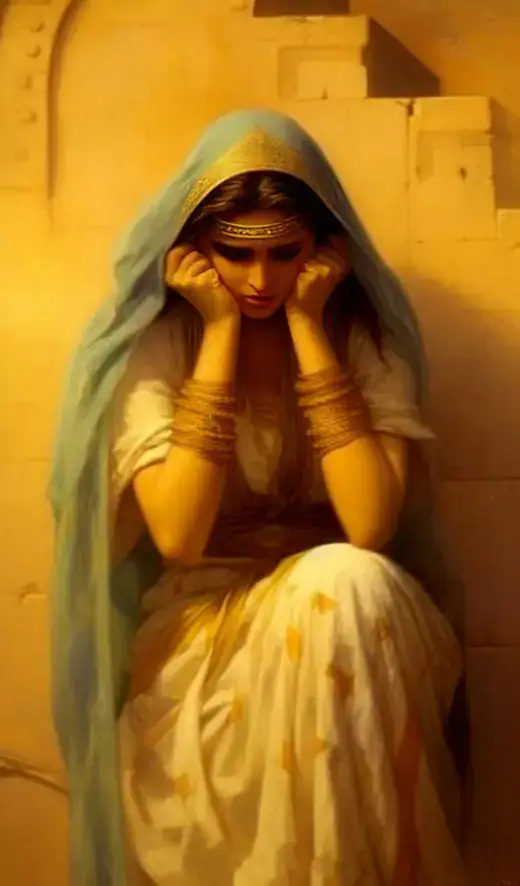
-
Save
The Couple’s Going Forth
The wealthy Pippali returned home and had a bath, went up to the upper terrace and sat down on a high seat, which only noble personalities deserve. Then the feast worthy of a Universal Monarch was arranged and served to the merchant. Both the wealthy Pippali and his wife Bhaddākāpilānī ate the meal, and when their servants went away, they retired to their quiet resort and stayed quietly at ease.
Thereafter, the two discussed between themselves as follows:
Pippali: Madam Bhaddā, when you came to this house, how much wealth did you bring?
Bhaddā: I brought my wealth by fifty-five thousand carts.
Pippali: The wealth brought by you and the wealth extant here in this house, such as eighty-seven crores of riches, sixty mechanized dams, etc. I entrust them all with you.
Bhaddā: Oh, but where are you going?
Pippali: I am going to make myself a recluse, Madam,
Bhaddā: Oh, Sir, I too have been readily waiting for the time of your coming back. I too shall become myself a female recluse.
To these two individuals who were endowed with pāramīs, the three existences of sensual pleasures (kāma), materiality (rūpa) and immateriality (arūpa) manifested to be three leafhuts blazing with fire. The two great personality of pāramī, therefore, had the robes and bowls bought from the market and had one’s hair shaved by the other. Saying:
“We dedicate our renunciation of the world to the noble arahats.”
They came down from the main terrace with their bags, in which were put their bowls, hanging from their left shoulders. None of the servant and workers at home, male or female, recognize the two pāramī seekers.
Then the couple left the brahmin village of Mahātittha and went out by the servants’ village gate. They were seen and recognized from their behaviour that they were their master and the mistress. Crying bitterly the servants fell at their feet and asked sorrowfully:
“Master and mistress, why do you make us helpless?”
The couple replied: “We have become recluses as we were shocked by the likeness between the three existences and the leaf-hut on fire. If we were to set you free from servitude, one after another there will be no end even after a hundred years. Get your heads washed and be liberated from servitude and live free.”
So saying they left while the servants were wailing.
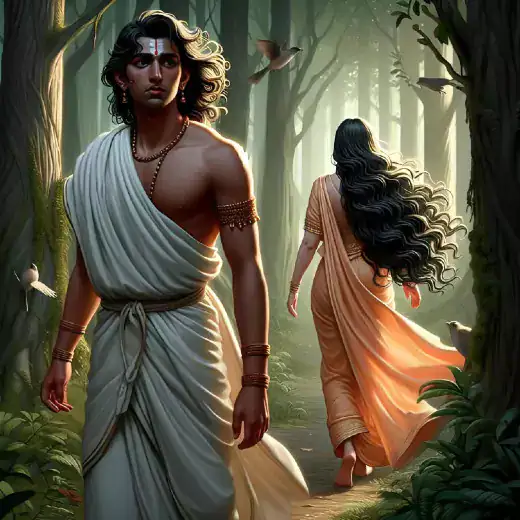
-
Save
Parting Company with Each Other
While he was going ahead, Pippali the noble Thera thought in retrospect thus:
“This beautiful Therī Bhaddākāpilānī, who is precious as much as the whole Jambudipa has been following me. There is reason for anybody to misunderstand us, thinking: ‘These two cannot part from each other even though they have become recluses; they are doing something not in harmony with their ascetic guise.’ And if one misunderstands us, one is in danger of been reborn in a state of woe. Therefore I should desert this fair lady, Therī Bhaddākāpilānī.”
As he went on ahead, the noble Thera found a junction of two roads and stopped there. Having followed from behind, Therī Bhadda (Bhaddākāpilānī) stopped there too and stood with her hands joined in reverence. Then the noble Thera addressed the Therī:
“Bhaddā Therī, people seeing a beautiful lady like you following me might offend us by wrongly thinking: ‘These two individuals cannot part from each other despite their ascetic life and would thereby be reborn in a woeful state.’ So take whichever road you choose between these two. I shall go by the road you do not prefer.”
Therī Bhaddā too replied thus: “Oh, yes, Sir! womankind means blemish to a monk. People would also blame us, saying that we are unable to leave each other even after becoming ascetics. You, Sir, follow one road. I shall follow the other. Let us be separated.”
Then she circumambulated exactly three times, and paid homage respectfully with the five kinds of veneration at the four places, such as the front, the back, the left and the right of the Thera. With her hands joined and raised, she said:
“Our love and intimacy as husband and wife that started a hundred aeons ceases today.” She added: “You are of nobler birth, so the road on the right befits you. We womenfolk are of lesser birth. So the left one suits me.” Saying thus she proceeded by the left road.
When the two walked separate paths, the great earth quaked, roaring echoingly as if it were uttering: “Though I can bear up the universal mountains and Mount Meru, I cannot do so with regard to the virtues of these two marvellous personages!” There appeared thundering sounds in the sky, too. The universal mountains and Mount Meru grew up higher and higher (because of the earthquake).
It is noteworthy that both husband and wife renounced the world together. The husband, the Venerable Mahā Kassapa-to-be, at a forked road took the right turn while his wife, Bhaddhākāpilānī, the left turn. The former, met the Buddha sitting under the great banyan (pipal) tree, known as Bahuputtaka. At that time, women were not yet admitted into the Order, so Bhaddākāpilānī had to spend five years as a wandering ascetic.
Around five years later Mahā Pajāpatī Gotamī went forth as the first of the nuns, and not long after Bhaddā received ordination from her, attained Liberation and was placed at foremost amongst those who could remember their former lives. The male disciple having this same quality was Ven. Sobhita.
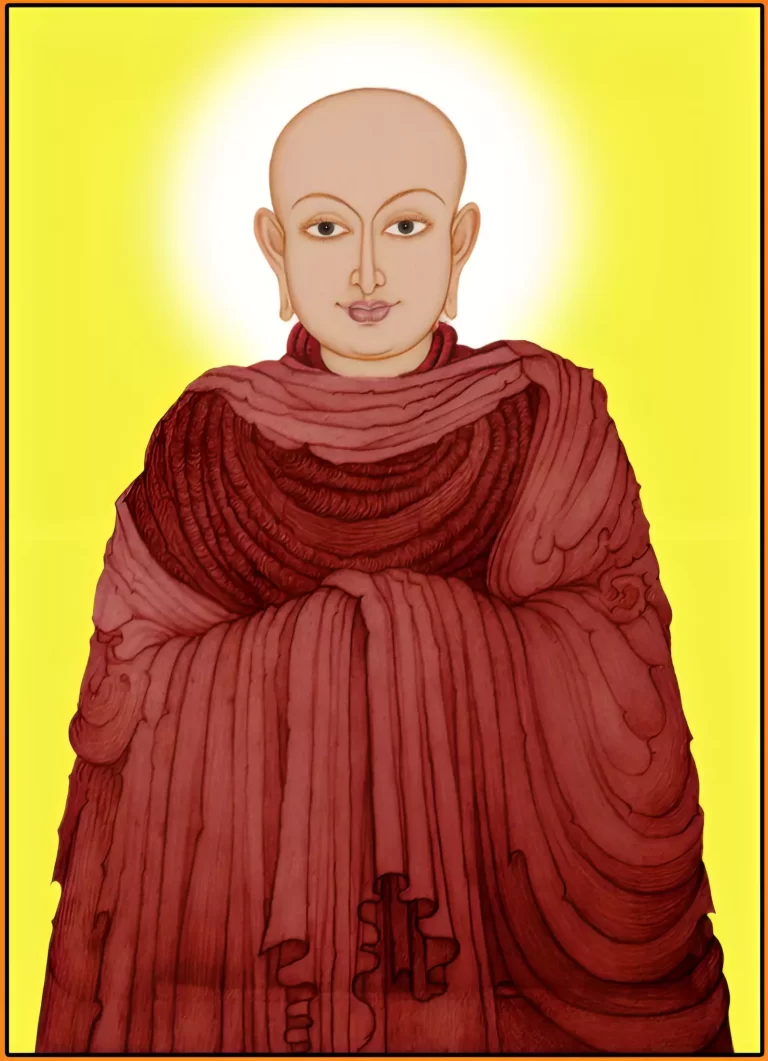
-
Save
Bhaddākāpilānī Therī as The Foremost Bhikkhunī
Thanks to her past aspiration, Bhaddākāpilānī Therī, after attaining arahatship, was exceptionally competent in remembering past existences.
Therefore, on one occasion when the Buddha was residing at the Jetavana monastery and naming distinguished bhikkhunīs, He declared:
“Bhikkhus, among My bhikkhunī-disciples who can recall past existences, Bhaddā, who is now called Kāpilānī, is the foremost (etadagga).”
(From the Book: The Great Chronicle of Buddhas | by Ven. Mingun Sayadaw
